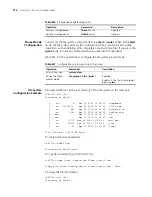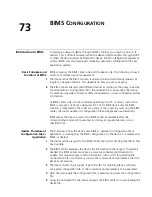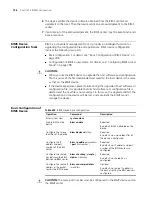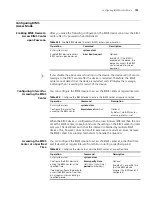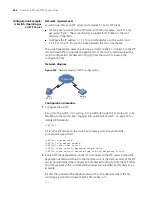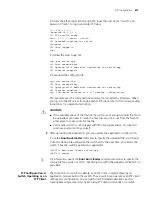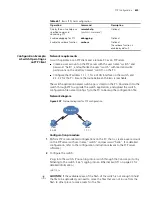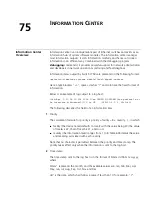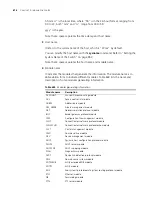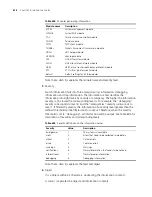
74
FTP
AND
TFTP C
ONFIGURATION
FTP Configuration
Introduction to FTP
FTP (file transfer protocol) is commonly used in IP-based networks to transmit files.
Before World Wide Web comes into being, files are transferred through command
lines, and the most popular application is FTP. At present, although E-mail and
Web are the usual methods for file transmission, FTP still has its strongholds.
As an application layer protocol, FTP is used for file transfer between remote server
and local host. TCP port 21 is used for control connections, and port 20 is used for
data connections. Basic FTP operations are described in RFC 959.
FTP-based file transmission is performed in the following two modes:
■
Binary mode, which is used for program file transfer.
■
ASCII mode, which is used for text file transfer.
An Ethernet switch can act as an FTP client or an FTP server in an FTP
implementation.
■
FTP server
An Ethernet switch can operate as an FTP server to provide file transmission
services for FTP clients. You can log into a switch operating as an FTP server by
running an FTP client program on your PC to access the files on the FTP server. To
accept login requests, an FTP server must be assigned an IP address.
Table 637 describes the configurations needed when a switch operates as an FTP
server.
Table 637
Configurations needed when a switch operates as an FTP server
Device Configuration
Default Description
Switch
Enable the FTP server
function
The FTP server
function is disabled
by default
You can run the
display ftp-server
command to view the
FTP server configuration
on the switch.
Perform
authentication-/auth
orization-related
configuration
By default, FTP server
logon authentication
and authorization are
not configured.
Configure user names,
passwords, and the
work directory.
Configure the
connection idle time
The default idle time
is 30 minutes.
-
Summary of Contents for Switch 7757
Page 32: ...32 CHAPTER 1 CLI OVERVIEW...
Page 70: ...70 CHAPTER 5 LOGGING IN USING MODEM...
Page 76: ...76 CHAPTER 7 LOGGING IN THROUGH NMS...
Page 86: ...86 CHAPTER 9 CONFIGURATION FILE MANAGEMENT...
Page 120: ...120 CHAPTER 13 ISOLATE USER VLAN CONFIGURATION...
Page 126: ...126 CHAPTER 14 SUPER VLAN...
Page 136: ...136 CHAPTER 16 IP PERFORMANCE CONFIGURATION...
Page 152: ...152 CHAPTER 17 IPX CONFIGURATION...
Page 164: ...164 CHAPTER 19 QINQ CONFIGURATION...
Page 172: ...172 CHAPTER 21 SHARED VLAN CONFIGURATION...
Page 182: ...182 CHAPTER 22 PORT BASIC CONFIGURATION...
Page 198: ...198 CHAPTER 24 PORT ISOLATION CONFIGURATION...
Page 208: ...208 CHAPTER 25 PORT SECURITY CONFIGURATION...
Page 224: ...224 CHAPTER 27 DLDP CONFIGURATION...
Page 232: ...232 CHAPTER 28 MAC ADDRESS TABLE MANAGEMENT...
Page 240: ...240 CHAPTER 29 CENTRALIZED MAC ADDRESS AUTHENTICATION CONFIGURATION...
Page 280: ...280 CHAPTER 30 MSTP CONFIGURATION...
Page 348: ...348 CHAPTER 35 IS IS CONFIGURATION...
Page 408: ...408 CHAPTER 39 802 1X CONFIGURATION...
Page 412: ...412 CHAPTER 40 HABP CONFIGURATION...
Page 422: ...422 CHAPTER 41 MULTICAST OVERVIEW...
Page 426: ...426 CHAPTER 42 GMRP CONFIGURATION...
Page 480: ...480 CHAPTER 47 PIM CONFIGURATION...
Page 506: ...506 CHAPTER 48 MSDP CONFIGURATION...
Page 552: ...552 CHAPTER 51 TRAFFIC ACCOUNTING CONFIGURATION...
Page 570: ...570 CHAPTER 53 HA CONFIGURATION...
Page 582: ...582 CHAPTER 54 ARP CONFIGURATION SwitchA arp protective down recover interval 200...
Page 622: ...622 CHAPTER 58 DHCP RELAY AGENT CONFIGURATION...
Page 684: ...684 CHAPTER 61 QOS CONFIGURATION...
Page 718: ...718 CHAPTER 63 CLUSTER...
Page 738: ...738 CHAPTER 67 UDP HELPER CONFIGURATION...
Page 752: ...752 CHAPTER 69 RMON CONFIGURATION...
Page 772: ...772 CHAPTER 70 NTP CONFIGURATION...
Page 796: ...796 CHAPTER 72 FILE SYSTEM MANAGEMENT...
Page 802: ...802 CHAPTER 73 BIMS CONFIGURATION...
Page 814: ...814 CHAPTER 74 FTP AND TFTP CONFIGURATION...
Page 830: ...830 CHAPTER 75 INFORMATION CENTER...
Page 836: ...836 CHAPTER 76 DNS CONFIGURATION...
Page 852: ...852 CHAPTER 77 BOOTROM AND HOST SOFTWARE LOADING...
Page 858: ...858 CHAPTER 78 BASIC SYSTEM CONFIGURATION DEBUGGING...






